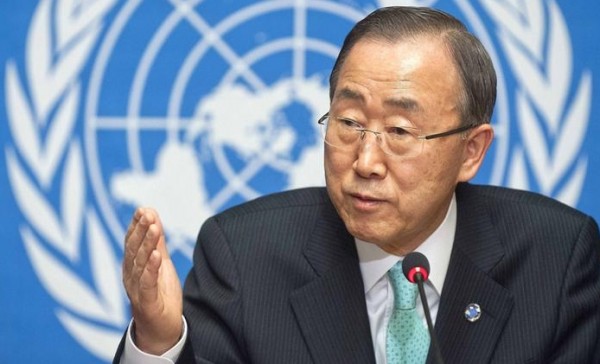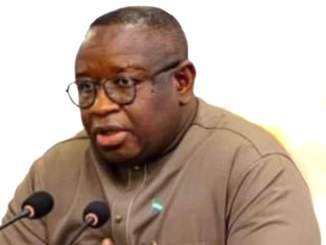
3 May 2016 – Top United Nations officials today highlighted the dependency of human rights, democratic societies and sustainable development on the free flow of information and press freedom, stressing that these fundamental rights are vital in providing information to citizens around the world and for progress itself.
“Press freedom and the free flow of information are necessary not only to inform citizens about the [Sustainable Development] Goals, but to enable them to hold their leaders accountable for fulfilling the pledges they have made,” Secretary-General Ban Ki-moon said in his message marking World Press Freedom Day, which is observed on 3 May each year. “The media – including, and increasingly, new online media – serve as our eyes and ears. We all benefit from the information they provide,” he added.
In particular, Mr. Ban emphasized that human rights, democratic societies and sustainable development depend on the free flow of information, and that the right to information depends on press freedom.
Each year, World Press Freedom Day is observed to emphasize these fundamental principles, to protect the independence of the media, and to honour media workers who risk and have lost their lives in the exercise of their profession, the Secretary-General said.
The UN General Assembly designated 3 May as World Press Freedom Day in 1993. It aims to celebrate the fundamental principles of press freedom; to evaluate press freedom around the world; to defend the media from attacks on their independence; and to pay tribute to journalists who have lost their lives in the exercise of their profession. This year’s theme for World Press Freedom Day is ‘Access to information and fundamental freedoms – this is your right!’
In his message, the UN chief highlighted that this year, World Press Freedom Day coincides with three important milestones. It is the 250th anniversary of the world’s first freedom of information law, covering both modern-day Sweden and Finland, and it is the 25th anniversary of the adoption of the Windhoek Declaration of press freedom principles. In addition, 2016 is also the first year of implementing theSustainable Development Goals (SDGs).
Mr. Ban also said that he is very concerned about the increasingly restrictive environment for media workers in many countries, stressing that “constraints on freedom of expression place shackles on progress itself.”
“A free, independent and safe media environment is essential. Yet, all too often, journalists are threatened, harassed, obstructed or even killed in the pursuit of information. Many languish in detention, some in appalling conditions, for shedding light on governance failures, corporate malfeasance or societal problems,” the Secretary-General said.
He urged all Governments, politicians, businesses and citizens to commit to nurturing and protecting an independent, free media.
“Without this fundamental right, people are less free and less empowered. With it, we can work together for a world of dignity and opportunity for all,” Mr. Ban said.
Along those lines, Irina Bokova, Director-General of the UN Educational, Scientific and Cultural Organization (UNESCO), stressed that access to information is a fundamental freedom and part of the basic human right to freedom of expression.
“Receiving and imparting information, both offline and online, is a cornerstone of democracy, good governance, and rule of law,” she said.
Ms. Bokova noted that this past year, the world had agreed on the 2030 Agenda for Sustainable Development to guide all efforts over the next 15 years to end poverty, protect the planet, and ensure prosperity and lasting peace for all. The new SDGs include a target on public access to information and the protection of fundamental freedoms – two interrelated objectives that are key accelerators of progress across all of the new agenda, she stressed.
“At this time of turbulence and change across the world, including new challenges that require global cooperation and action, the need for quality information has never been so important – this requires a strong environment of press freedom and well-functioning systems to ensure the people’s right to know,” the Director-General said.
Ms. Bokova highlighted that 250 years ago, the first formal Right to Information legislation was enacted in what is today Sweden and Finland. A historical breakthrough at the time, she emphasized that this still provides inspiration today, as Governments increasingly adopt laws that allow public access to information. In addition, 25 years ago, in then newly independent Namibia, the historic Windhoek Declaration on press freedom was adopted, paving the way to recognition by the UN of World Press Freedom Day.
“In marking these anniversaries, World Press Freedom Day this year highlights the importance of free and independent journalism for advancing the 2030 Agenda,” Ms. Bokova said.
“This includes the safety of journalists, at a time when, tragically, a media professional is killed every five days. This cannot stand, and guided by the UN Plan of Action on the Safety of Journalists and the Issue of Impunity, UNESCO is working with Governments around the world to create a free and safe environment for journalists and media workers everywhere,” she added.
“In this spirit, I call on everyone to stand united in defending and encouraging press freedom and the right to access to information. This is essential for human rights and dignity, for our aspirations for sustainable development, for common determination to build lasting peace,” Ms. Bokova said.
CULLED FROM THE UN NEWS SERVICE



